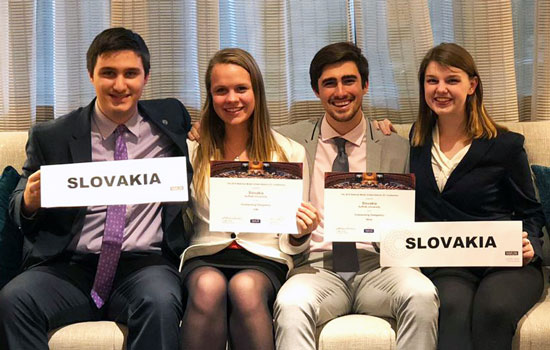Model UN Club Earns Awards as Members Learn Marketable Skills
From the playground to the office and even in the United Nations, there’s one question that can determine success or failure: Do people want to work with you?
In Model UN Club, Suffolk students learn to master massive amounts of information quickly and craft detailed policy papers. They also practice the more nuanced art of cooperation.
Each year the club travels to three or four competitive conferences. Teams are assigned country identities that they then represent on committees, and committee members work together to negotiate and draft policy statements. Teams and delegates are awarded points for accurately portraying their countries, contributing to each paper’s language, and working effectively with other “nations.”
“Model UN teaches students how to get along, come back another day, work with people they didn’t choose, and not take things personally,” says Government Professor Christina Kulich-Vamvakas, the Suffolk team adviser.

At this fall’s National Model UN conference in Washington, DC, the Suffolk team walked away with group and individual honors for representing Slovakia and Tajikistan. Prizes included an overall outstanding delegation designation for the Slovakian team and individual awards for Caroline Milligan and Ben Calitri in the World Health Assembly and Greta Thurston and Kostas Loukos on the International Organization for Migration.
Loukos, a sophomore government major and the club’s treasurer-elect, says it’s the team’s “soft skills” that gave it the edge.
“The best way to succeed is to know as much as possible about the topic but also to be nice and cooperative,” he says. ”You can represent the smallest country, but if you know how to work with people you can still run a committee and help draft language that’s so essential your country can’t be marginalized.”
The club also helps students develop the abilities that employers value most, says Kulich-Vamvakas. Each competition requires top-notch oral and written communication, analytical reasoning, teamwork, and the ability to apply knowledge to real-world situations -- all prized by hiring managers according to a 2018 report by the American Academy of Colleges and Universities.
Loukos is applying those skills at his State House internship this year, using familiar policy language to help draft resolutions. Competing in Model UN has given him the confidence and experience to speak up and get involved, serving him well in his internship and classes. He ran for a spot on the board of selectmen in his hometown last year and hopes to win an elected office before he graduates.
For Loukos, the most important aspect of Model UN has been representing countries he doesn’t always agree with and learning to understand their perspectives.
“Competing has taught me to assess and use my own strengths in negotiations with others,” he says. “I’ve learned to articulate my own value. That helps in competition, and it’s a useful skill in life.”
Contact
Greg Gatlin
Office of Public Affairs
617-573-8428
Andrea Grant
Office of Public Affairs
617-573-8410



